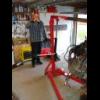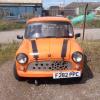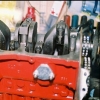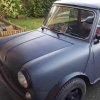You don't need thread lock with Nyloc nuts.
Nuts
#16

Posted 24 October 2014 - 10:05 AM
#17

Posted 24 October 2014 - 10:25 AM
You don't need thread lock with Nyloc nuts.
i meant with normal nuts instead of nyloc nuts or spring washers
#18

Posted 24 October 2014 - 11:28 AM
OK, I thought you meant with Nylocs.
I don't think thread locking compound is particularly helpful on fixings other than inside the engine/gearbox, although maybe for exhaust nuts & bolts it could help.
After a few years the problem is normally getting them undone!
One thing, not really related to nuts & bolts but relevant maybe, is to use some sort of sealing compound between components when bolting them together. That is done on aircraft and it keeps moisture from seeping between touching surfaces. Bathroom sealer is good and inexpensive. Typically use it between rear sub-frame mountings and the body-shell, top damper brackets to inner wings, seat brackets to cross-member, etc.. Just wipe off the surplus before it goes hard and it will keep the moisture out for ever. You can also coat the bolts with it so that water can't cause them to rust in place. Obviously only on cold areas ![]() .
.
#19

Posted 24 October 2014 - 12:22 PM
Loctite will also act as a sealing compound, as will copper grease. It'll be squeezed out of the mating faces, but it's the friction on the side face of the nut/bolt that does most to keep it fastened anyway. Fasteners with built in flanges have this as one of their advantages. Be wary of the effects on the torque values if you alter the fasteners or coat them in a magic goop.
I've never been convinced by the "use once" claims for nylocs, as far as their being much different to a plain nut. Surely, once it's fully engaged on the thread, winding it further down a screw until it clamps will be just as bad as removing it? You could easily do your own experiments if you have a reversible wrench to measure the undoing torque.
#20

Posted 24 October 2014 - 12:32 PM
In aviation Nyloc nuts are strictly 'single use only'. That doesn't mean that if used more than once they will fail to do what they are intended to do, just that they MAY not be as effective.
One trick for second use, not ever to be used in aviation I quickly add, is to put the nut, face downwards, on a steel plate and give the top a sharp tap with a flat-faced hammer. That pushes the retaining lip onto the nylon which makes it a 'stiff nut' again.
#21

Posted 24 October 2014 - 12:44 PM
Now maybe it's an Aircraft mentality thing going on here but we always remove and discard Nylocs even castellated ones and fit new. You still need to do a physical inspection on the new nut to ensure the Nylon component is actually present. We do get them time to time without the nylon insert fitted.
We do prefer stiff nuts over Nylocs BUT we install locking hardware in accordance with either the IPC AMM or CMM. This is the manufacturers instructions as they have deemed them suitable for that particular installation. Deviate away from these instructions at your peril.
It's not the undoing torque that is the issue, by the time you have run the nut up the thread to remove it there maybe more damage done to the locking component. For us it's always run down torque as quoted in the AMM and for those who do not know what this Acronym means it's the Aircraft Maintenance Manual.
We could pick this part if we want but it's what's deems as the correct method of checking any used or new locking devices by any Aircraft manufacturer.
#22

Posted 24 October 2014 - 12:50 PM
Yep, aviation is a different ball game, there's no hard shoulder at 30 000 feet ![]()
I suppose suspension and brakes are as near as you get with a car.
Since we're having a fasteners "workshop" it's worth chucking in the quality of the washers is as important as the fastener. High tensile bolts won't act like they are if you use washers with the hardness of Playdough.
#23

Posted 24 October 2014 - 12:54 PM
Like you, Sonikk, I have the aircraft mentality which came from a 5-year aircraft engineering apprenticeship and subsequently many years in aircraft design.
Having also worked on automotive design, some of the engineering principles still surprise me (like the mixing of metric and imperial threads on the Mini braking system!).
In aviation, we tend to err on the side of caution, which is wise and maybe not so necessary with automotive where, in most cases, a failure will mean a stop beside the road whilst awaiting the RAC, not a forced landing or worse.
When I work on my own gliders and on my club's aircraft I never ever consider re-using a Nylok. I would rather mark the aircraft as U/S if I run out of new ones.
It's all in the AMM's and it's 'best practice' as well.
Overkill? Maybe, but safe.
#24

Posted 24 October 2014 - 01:08 PM
#25

Posted 24 October 2014 - 01:46 PM
I always thought not best to reuse nyloks because if the thread is slightly rusty or even dirty when you wind it off it might tear the nylon. This is the same if you were to wind a new nylok onto a dirty or rusty thread
removing the nut will partially clean the threads then the nut goes in the bin.
I always clean up the threads with a wire brush when replacing parts. If a removable bolt and very rusty .. it gets replaced.
#26

Posted 24 October 2014 - 01:55 PM
At the end of the day i think there is enough info here for the OP to take onboard the merits of different locking methods and the correct way to utilize them.
Do things correctly and you will not have to worry whether you are flying or driving.
#27

Posted 24 October 2014 - 03:18 PM
At the end of the day i think there is enough info here for the OP to take onboard the merits of different locking methods and the correct way to utilize them.
Do things correctly and you will not have to worry whether you are flying or driving.
what your not locking the thread are you!!!! ![]() if so what method will you be using?
if so what method will you be using?
#28

Posted 24 October 2014 - 05:30 PM
1 user(s) are reading this topic
0 members, 1 guests, 0 anonymous users



















